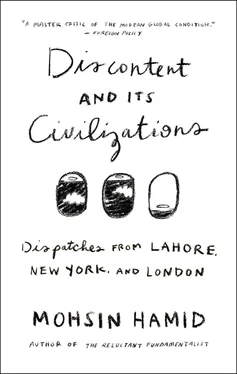Suspicion of Muslims is, of course, not confined to Europe. Earlier this year, on a trip from Pakistan to New York with my wife and baby daughter, I had my usual lengthy encounter at JFK airport with an American version of the same theme. Sent to secondary inspection, I waited my turn to be investigated. Eventually it came, the officer questioning me about such things as whether I had ever been to Mexico or received combat training.
As a result, we were the last passengers on our flight to claim our luggage, a lonely set of suitcases and a foldable playpen on a now-stationary baggage carousel. And until we stepped out of the terminal, my heart kept pounding in a way incongruent with my status as a visitor with papers in order.
When we returned to Pakistan, a shock wave from a suicide bombing, the latest deadly attack by militants intent on destabilizing the country, passed through my sister’s office in Lahore. The blast killed several people, but was far enough from the university where my sister teaches not to harm anyone on campus or shatter her windows. It did open her office door, though, pushing it firmly ajar, like a ghost exiting into the hallway outside.
Some might argue episodes such as these are signs of a clash of civilizations. But I think not. Individuals have commonalities that cut across different countries, religions, and languages — and differences that divide those who share a common country, religion, and language. The idea that we fall into civilizations, plural, is merely a politically convenient myth.
Take two notional civilizations, namely those of “Muslims” and “Westerners.” To which do my Pakistani friends in Amsterdam or I belong? They are secular and believe in equal rights irrespective of gender or sexual orientation. And I, a citizen and resident of Pakistan, have spent seventeen years in America, longer than the lifetimes of more than seventy million Americans born since 1993.
Westernized Muslims, Islamized Westerners: surely people like us can be disregarded as recent, tiny, and unrepresentative minorities? Actually, no. Fly from Lahore to Madrid and you will find that the words for “shirt” and “soap” are virtually the same in both places, linguistic testament to the fact that people have always intermingled.
Yes, Pakistani murderers set off bombs that annually kill thousands. And yes, some Pakistanis fit the stereotype of poor, radicalized, seminary-educated militants. But they live in a nation where under 10 percent vote for parties of the religious right, where a rapidly growing majority watches television.
Pakistani television programming is incredibly diverse for good reason: so is the country. The blast wave that passed through my sister’s office doubtless passed through devout Muslims, atheist Muslims, gay Muslims, funny Muslims, and lovestruck Muslims — not to mention Pakistani Christians, Chinese engineers, American security contractors, and Indian Sikhs. What civilization, then, did the bomb target? And from what civilization did it originate?
Civilizations are illusory. But they are useful illusions. They allow us to deny our common humanity, to allocate power, resources, and rights in ways repugnantly discriminatory.
To maintain the effectiveness of these illusions, they must be associated with something undeniably real. That something is violence. Our civilizations do not cause us to clash. No, our clashing allows us to pretend we belong to civilizations.
In Pakistan, I live as part of an extended family. My parents built their house adjoining that of my grandparents. My wife and I built our apartment above the house of my parents. Our daughter needed a room. So we converted our balcony, adding a corrugated-metal, foam-insulated roof, and some well-shaded, double-glazed windows.
The room was bright, inexpensive, energy efficient, and quick to build. All we wanted, in other words. But then it occurred to us that our daughter’s windows faced in the direction of a main road. A hundred yards away were offices, shops, banks. The kinds of places sometimes attacked in our city.
I decided to ask an architect friend whether I ought to consider blast-resistant film for my daughter’s windows. Despite four generations of my family having lived in the same place, this was a question none of us had ever posed before. I had no idea whether such films were effective, or how much they might cost.
I did not wonder if they were made by factories in the West, by workers who were Muslim, by both, or by neither. No, I wondered instead if such films were truly transparent. For outside my daughter’s windows is a yellow-blooming amaltas tree, beautiful and mighty, and much older than us all.
I hoped not to dim my daughter’s view of it.
(2010)
Uniting Pakistan’s Minority and Majority
THERE’S A NURSE I know in Lahore. She’s tall and stocky, middle-aged. She is on call twenty-four hours a day and works six days a week. She’s also a freelance headhunter, placing cooks and drivers and maids. She sleeps little. She has five children to whom she hopes to give better lives. Last year, she donated time and money to flood victims.
She is a Pakistani Christian. And on Wednesday, I saw her weep.
She was staring at a TV set. It was reporting the assassination of Shahbaz Bhatti, Pakistan’s federal minister for minorities, a Roman Catholic. “What’s going to happen to Christians in this country?” she asked me.
I had no answer. But her question is searingly important. A country should be judged by how it treats its minorities. To the extent it protects them, it stands for the ennobling values of empathy and compassion, for justice rooted, not in might, but in human equality, and for civilization instead of savagery.
Pakistan ought to be exemplary in this regard. After all, ours is a nation of minorities: a patchwork of cultures, ethnicities, languages, and sects. Since independence, we’ve tried to use Islam to bind us together, to undo our inherent and pervasive minority-ness. After the country split in 1971, these appeals to religion expanded under Zulfikar Ali Bhutto and reached previously unimaginable extents under Zia-ul-Haq. They have continued to intensify ever since.
One problem with this approach, of course, has been that our religious minorities, a twentieth of our population, have been left out of our grand national narratives. Five percent may seem like a small proportion, but in absolute numbers it includes almost ten million Pakistanis, which equals everyone in Tunisia, or one and a half times all of Libya. If Pakistan’s religious minorities were a country, they would be more populous than half the members of the UN.
So how have they been treated by Pakistan? Shamefully. They are looked down upon, discriminated against, physically threatened, and not infrequently killed. They are second-class citizens in every sense. Nor has our state offered them much support. Indeed, our state has been actively involved in their oppression.
None of this is new, of course. So, for those fortunate enough to belong to the religious majority, does it even matter?
Yes. Desperately. Minority relations are a microcosm of society. Each individual human being is, after all, a minority of one. And, as Pakistan becomes a country at war with its minorities, it is becoming a country at war with its individuals, with itself, with you and with me, with the human desire to be allowed to believe what we believe. In this direction lies Orwellian Newspeak, an inability to say what we mean, a condition of external dishonesty that inevitably leads to internal dishonesty. Orwell imagined the result of this to be something he called doublethink: people holding “simultaneously two opinions which cancelled out, knowing them to be contradictory and believing in both of them.”
Читать дальше












